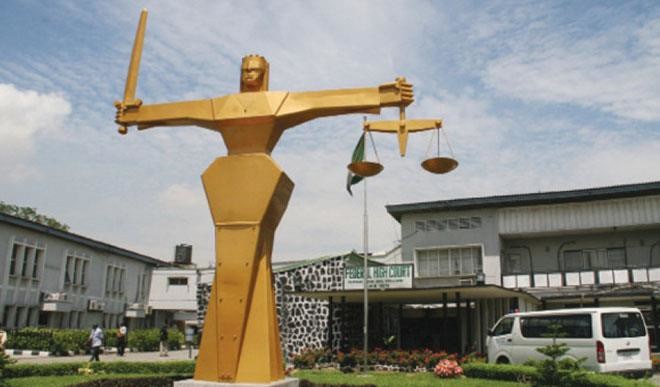News
Tuesday RapAround: Nigeria’s Judicial System On Trial

Nigeria’s Judicial System On Trial By Michael Ayotunde

In any sane society, the judiciary is said to be the last hope of the common man.
The Judiciary, as an arm of government, is responsible for interpreting the law of the land, while applying it in situations where they are necessary. This makes the job of the Judiciary a very critical one.
The law of the land constitutes the bases upon which judgments are ruled. It is therefore fundamental that its interpretation and application be carried out with absolute ardour, meticulousness and without favour, prejudice or favouritism.
The primary responsibility of the Judiciary is to ensure that the Executive and Legislative arms of government function within the ambits of the constitutional provisions made available to them. But where this all-important function is flagrantly abused, it remains to be seen how and or what measures are in place to checkmate such impunity in our judicial system – a thing that has become a recurring decimal in our national life.
In Nigeria of today, to say that the executive and the legislative arms of the government are enmeshed in one form of impropriety or the other is to say the least. The judiciary on its part, sadly too, cannot be exempted from this inglorious scenario, just because they too are part of the system – the system that has been grossly corroded and ignominiously abused.
At this junction, it is noteworthy to submit that instances of miscarriage of justice abound in the society. In fact, that seems to be the order of the day. Little wonder some highly placed judicial officers have been accused of indulging in sharp practices.
To this end, personnel problems constitute by far the most daunting challenge facing the judiciary and is the single most important problem threatening the sanctity of the judiciary as the bastion of justice. The judiciary comprise of judicial officers who are human beings like every other Nigerian and therefore subject to the vagaries of human nature in its insidious form.
While there are good, intellectually sound and upright judicial officers of impeccable character and integrity in the country, it is regrettable to say that a sizeable percentage of judicial officers in Nigeria fall below the standard expected of judicial officers in the area of intellectual capability, uprightness, character and integrity and this reflects in the poor quality of judgments delivered by the various courts in Nigeria and the growing problem of conflicting judgments and the attendant confusion it brings in the legal system in Nigeria.
This, in all honesty, is one area that beats the rational thinking of most discerning minds in the society.
For instance, on July 13, 2017, an Ado-Ekiti High Court sentenced a 19-year-old boy, Adeolu Bamiteko, to death by hanging for armed robbery. The Judge (name withheld) who handed the sentence, also slammed another 10-year jail term on the convict for unlawful possession of firearms. The judge held that the accused was guilty as charged having committed the offence contrary to Section 6 (b) of Robbery Firearms (Special Provisions) Act Cap R11 Laws of Federation of Nigeria 2004.
Again, on October 5, 2017, pages of the newspapers were awash with story of one Izunna Ajaere, a 25-year-old male hairdresser who was found culpable for stealing a laptop and a mobile phone at gunpoint. Ajaere was found guilty based on the two-count charge of conspiracy and armed robbery and was sentenced to death by hanging.
The judge in her judgment, noted that the evidence of the victim of the crime, one Mr Uchenna Ukah, was “overwhelming and pivotal” in convicting Ajaere.
Hnm! What could have been more “overwhelming and pivotal (quoting from the judge’s statement) than what the poor hairdresser has done? In short, the list is endless.
These two instances, however, are just few of the many atrocities that people commit virtually on daily basis and they are handed heavy punishment. Notably, the cases have certain things in common – mobile phones theft and or other valuable accessories.
Judgment of this nature, are sometimes done with in some ways to serve a lesson or precautionary measure to prevent others from committing such crimes. This condition as good as it may sound, has after all failed. Reason – the more heavy judgments are handed down to culprits, the more other similar crimes are being committed.
Sadly too, situation where heavy judgments are usually handed down to convicts of pilfering, phone thefts etc, while others who usually commit what people naturally classified as higher offences such as money laundering, siphoning of public funds, betrayal of public trust are sometimes given lesser judgments – sometimes ‘a go-and-sin-no-more’ or‘pat-on-the-back’judgment, is worrisome, if not disheartening.
On this premise, can one safely say or posit that the makers of law of the land deliberately fashioned out the nation’s laws to fight and prevent crimes (in whatever form) at the local level with stiffer penalty, and in a way, designed a lenient system at the upper level – all in a bid to prepare a soft landing for the so-called ‘pen robbers’ in public establishment?
The gloomy scenarios painted above brings to fore how faulty and nauseating the judicial system of the country is structured. Was it that the law of the land was designed to have multiple applications and interpretations?
And in some respect, people would naturally say there is equality before the law. How justifiable is this assertion?
It was once argued that ab-initio, the judicial system in Nigeria was in a state of perpetual decline. The legislations had loopholes, voids and inconsistencies, such that it was repugnant that they could not address the rising needs of society in a democratic government. Sadly too, new trends such as dangerous politicking have aggravated the already precarious state of the nation’s judicial system. The notion that justice is usually served to the highest bidders is no longer a new thing.
On this premise, for a government that prides itself as a corruption fighter, and one that is ever ready to tame the hydra-headed monster, it needs to do more than it is currently doing – that is, if it is going to have meaningful records of successful fight against corruption.
First and foremost, there is an urgent need for a total overhaul of the judicial system in the country – this ultimately should cut across the criminal justice system, penal code among others with a view to making them consistent with modern reality.
Without genuine, sincere approach, with same backed up with strong political will to effect this much-needed turn around in the nation’s judicial system, the nation will continue to wander and wallop in perpetual merrygoround – motion without movement.
Why would real socio-economic and political saboteurs who might have gravely altered our collective interest; and go all out to pervert the course of natural justice (sure, they have the wherewithal), are now allowed to go the way of plea bargaining and in the process loses a paltry of what is stolen and summarily left off the hook?
This is the more reason why a recent call by some members of the House of Representatives to put in place an amnesty package for treasury looters is totally seen and regarded as a great disservice to this nation. Though, the motion may have been put on hold for now, the mere fact that some unscrupulous members in the nation’s green chamber could devote their time and energy on such unfortunate and frivolous venture is not only nauseating, but disgracefully perverted, ignominiously infantile and spuriously demented.
-

 Opinion5 days ago
Opinion5 days agoThe Clout-chasing Dipo Awojide By Comrade Da’Peace
-

 News4 days ago
News4 days agoRamadan, Lent: Shettima Calls For National Unity And Compassion
-

 Opinion4 days ago
Opinion4 days agoReinventing Osun’s Economy Through Dagbolu Intl. Trade Centre: From Quiet Market Lessons To Regional Trade Revolution By Adeboye Adebayo
-

 News4 days ago
News4 days ago‘Wike Factor’: Another PDP Chairmanship Candidate Steps Down For APC In FCT













